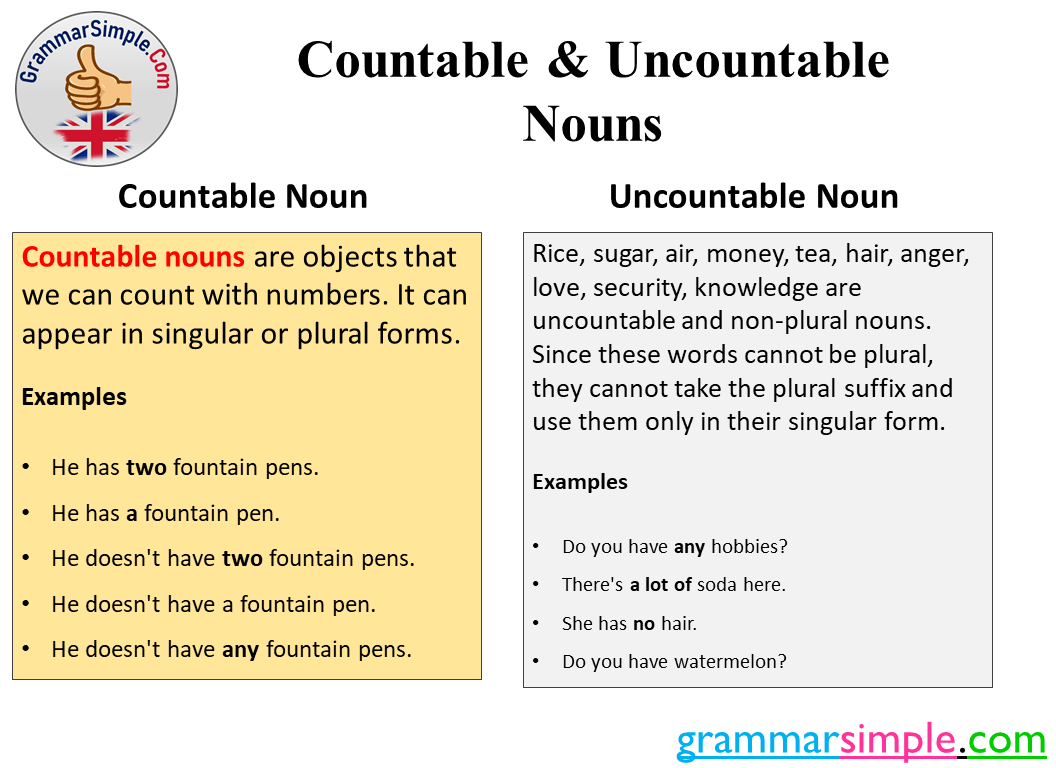Countable and Uncountable Nouns in English, Definition and Examples


Countable and Uncountable Nouns in English, Definition and Examples
Table of Contents
Countable and Uncountable Nouns
In English, nouns are divided into countable and uncountable. Countable nouns are those that we can count concretely, such as pear, apple, and book. Uncountable nouns are those that we cannot count one by one, such as rice, water, honey. In fact, rice, which is one of the names we give as uncountable, is an object that we can count if we try. But when we go to the market in our daily life, we say to the seller, “I want to buy one thousand four hundred and thirty-three grains of rice.” we do not say. Instead, we say the weight of the rice we want to buy, for example, one kilogram. This is the case for many uncountable objects. Another example of this is money. Although we think that we can count money, it is in the category of those that cannot be counted because we do not count money, but the value of money.
Countable Nouns
Countable nouns are objects that we can count with numbers. It can appear in singular or plural forms.
Examples
- He has two fountain pens.
- He has a fountain pen.
- He doesn’t have two fountain pens.
- He doesn’t have a fountain pen.
- He doesn’t have any fountain pens.
If we want to know the number of objects, “How many?” We use the question. We use “any” in interrogative sentences to indicate a quantity, as in negative sentences.
- How many pencils does he have?
- Does he have any pens?
- I want to give John some of the peaches I picked from my garden.
- Mary has a menstrual dress she bought to wear at Christmas time.
- My brother has two dogs.
- I don’t have any paper with me.
- How many classes do you have this semester?
- My family no longer has a home.
Uncountable Nouns
Rice, sugar, air, money, tea, hair, anger, love, security, knowledge are uncountable and non-plural nouns. Since these words cannot be plural, they cannot take the plural suffix and use them only in their singular form.
Examples
Uncountable nouns do not use “a” or “an” in affirmative sentences. Instead of these, ambiguous words such as “some”, “a lot of”, “much”, plenty of”, “a bit of” is used. For example, “She has some honey.” We can give the sentence.
In negative sentences, all the words that indicate an indefinite amount such as “some” are used as “any”. For example, “He has no honey.” We can give the sentence.
In interrogative sentences, “How much?” we ask the question. We use “any” in interrogative sentences to indicate a quantity, just as in negatives.
- Do you have any hobbies?
- There’s a lot of soda here.
- She has no hair.
- Do you have watermelon?
Uncountable nouns cannot be used with “a” and “an”, but some uncountable words become countable when used with their surfaces or packages.
- Abigail has five candies.
- He needs to buy two packages of rice.
- We can have two mugs of coffee.
- We’re going to need a pack of salt to be able to cook.
Recent Posts
Use Rose in a Sentence, How to Use Rose with Example Sentences
Use Rose in a Sentence, How to Use Rose with Example Sentences
Use Yourself in a Sentence, How to Use Yourself with Example Sentences
Use Yourself in a Sentence, How to Use Yourself with Example Sentences
Use Picture in a Sentence, How to Use Picture with Example Sentences
Use Picture in a Sentence, How to Use Picture with Example Sentences
Use Claim in a Sentence, How to Use Claim with Example Sentences
Use Claim in a Sentence, How to Use Claim with Example Sentences
Use Treasure in a Sentence, How to Use Treasure with Example Sentences
Use Treasure in a Sentence, How to Use Treasure with Example Sentences
Use Raise in a Sentence, How to Use Raise with Example Sentences
Use Raise in a Sentence, How to Use Raise with Example Sentences